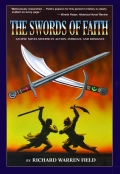What The Swords of Faith Says About Our Times June 16, 2010
Posted by rwf1954 in historical fiction, literary commentary.Tags: 2001, Nine-Eleven, religious fanaticism, religious fanatics, Richard the Lionheart, Saladin, September 11, September 11th
trackback
In my last post, I offered some ideas about how The Talisman was formed by the times of author Sir Walter Scott. This isn’t a criticism—it is a factor present in any literature or art. So how do I think our current times have shaped my novel, The Swords of Faith, due to be released on July 4th? Before I start into this, I need to admit that offering a commentary like this can only be a preliminary assessment because when writers are immersed in their time periods, there are influences swirling around that are not easily identified. Only the perspective of time passing allows a fully informed assessment. But, why not address the issue now? If nothing else, we can look back years from now and see if the initial comments still make any sense.
I fully admit that the events of September 11, 2001 inspired me to write this novel. The story of Richard and Saladin fascinated me for a long time, and in the back of my mind, I considered writing about it. Nine-Eleven brought the idea front-and-center.
I will identify three present-day influences I believe shaped The Swords of Faith, and how specifically they affected the book:
1. An understanding that terrorizing innocents has not always been the Muslim way. After Nine-Eleven, I found myself wanting to understand why these fanatic Muslims were so angry with us in the United States, why they were willing to kill so many innocent people and risk bringing down such terrible consequences on themselves. As I looked back at the history, at Saladin and other Muslim examples, I learned quickly that there is a constructive, altruistic side to Islam, historically, and in the present-day. What Western European historians commonly call the “Dark Ages” occurred while Muslims were experiencing their “Golden Age.” Muslims preserved Greek learning and advanced in many intellectual pursuits, including medicine and astronomy. These personal discoveries factor into the themes of The Swords of Faith. Knowing these facts beckons us to reach out to moderate Muslims, to Muslims who embrace the constructive and altruistic aspects of their faith. Then, together, we can defeat the fanatic terrorists trying to hijack Islam. (Kamran Pasha is a moderate Muslim who has written a throught-provoking, entertaining novel about the same time period as The Swords of Faith. His novel, Shadow of the Swords comes out on June 22nd.)
I will further develop this idea, with its complex historical aspects, in my follow-up novels, The Sultan and the Khan, The Ghosts of Baghdad and The Sultan and the Prince. It is important to consider that during the period from the late 1000s to the mid to late 1200s, Islam underwent an existence-threatening assault from two directions: the “Crusaders” from the West, and the far more severe threat of the Mongols from the East. The nobility of Saladin became a luxury Islam could not afford. The efficient ruthlessness of Baybars arguably provided Islam with what was needed for survival, and eventual victory. But a Baybars-instead-of-Saladin approach arguably changed Islam.
2. A desire to speak against demonizing an entire religion because of the actions of a few fanatic extremists. I have written at length against demonizing Islam; my essay “Demonizing Islam is Both Wrong and Foolish,” (published in August 2009 in Opposing Viewpoints: Islam.) The Swords of Faith reflects this idea. Demonizing the fanatic aspects of religion leads to counter-fanaticism, an effect absolutely in play during the Crusades. In The Swords of Faith, all four of the main characters (Richard, Saladin, and two fictional characters) thrive best when they approach the world without religious fanaticism. They have the most trouble when they lapse into fanaticism.
3. There is more than one path to God. This the most personal of the influences, an idea pervasive in our culture, but definitely not embraced by even a majority. Religious tolerance is honored, but the proselytizing religions of Christianity and Islam still have, in my opinion, the baggage of claiming to be the only “true faith.” I believe the idea that there is more than one path to God is an idea for our times, and I pursue that theme in The Swords of Faith. I will be developing this theme in additional writing.
I invite comments, particularly from readers of The Swords of Faith.
Items mentioned in this blog with links to purchase at Amazon.com:





There’s a verb missing in the title.
That’s an interesting observation that Islam changed between the 11th and 13th century. I know some of the events, but that connection never occured to me.
Heh, I should get my nose out of the Roman books and into other stuff. Once I’ve finished that blasted series. 😉
Actually, I read other non fiction as well; right now it’s mostly the Ottonian and Salian emperors.
Thanks for the help with the missing verb. Now everyone who comes after will wonder what we’re talking about!
Yes – from Saladin to Baybars in a few generations…
Assuming that Islamic people were behind 9/11. Many believe it was an inside job. Not me, but I have heard that it was an insurance scam by Marvin Bush… The World Trade Center was having difficulty finding tenants and more and more businesses were moving out to lower cost rentals outside of Manhattan… I’m still mystified by what happened to building SEVEN… Apparently it was rigged with explosives to make demolition easy… How did they know in advance that they were going to have an opportunity to do a controlled demolition? It must take a week or two to set the charges.